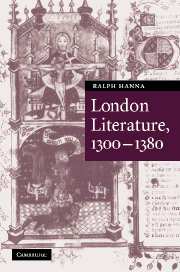Book contents
- Frontmatter
- Contents
- List of abbreviations
- In Thrall
- 1 English vernacular culture in London before 1380: the evidence
- 2 The ‘Old’ Law
- 3 Reading romance in London: The Auchinleck Manuscript and Laud misc. 622
- 4 Pepys 2498: Anglo-Norman audiences and London biblical texts
- 5 Anglo-Norman's imagined end
- 6 ‘Ledeþ hire to Londoun þere lawe is yshewed’: Piers Plowman B, London, 1377
- The end of early London literature
- Bibliography
- Index of manuscripts cited
- General index
- Cambridge Studies in Medieval Literature
5 - Anglo-Norman's imagined end
Published online by Cambridge University Press: 22 September 2009
- Frontmatter
- Contents
- List of abbreviations
- In Thrall
- 1 English vernacular culture in London before 1380: the evidence
- 2 The ‘Old’ Law
- 3 Reading romance in London: The Auchinleck Manuscript and Laud misc. 622
- 4 Pepys 2498: Anglo-Norman audiences and London biblical texts
- 5 Anglo-Norman's imagined end
- 6 ‘Ledeþ hire to Londoun þere lawe is yshewed’: Piers Plowman B, London, 1377
- The end of early London literature
- Bibliography
- Index of manuscripts cited
- General index
- Cambridge Studies in Medieval Literature
Summary
The period from the late 1360s, that context in which the Pepys MS was copied, already saw many sweeping cultural changes, foretastes of the future. Among these, one might reckon the death of Anglo-Norman. Of course, Anglo-Norman's historical end lies well outside the period; as a well-known, mostly south-eastern lingua franca, it survived the Middle Ages, eventually, as ‘Law French’ to be euthanised by statute in 1731. But its last two poets are John Gower and, the focus of this chapter,Sir John Chandos's Herald. The latter describes the period c. 1370–85 as one of crisis and disorder, both as event within his strongly retrospective narrative and as the social context into which he presents his text. His discussion, beyond pointing to the similar sense of crisis that turned a London hanger-on,William Rokayle, intoWilliam Langland, the poet of Piers Plowman, exemplifies Anglo-Norman's imagination of its own (preordained, I'm afraid) end as a literary culture.
The Chandos Herald (who signs the last line of his work) is not precisely an English figure at all. As his great editor, Mildred K. Pope, demonstrated, he came from Hainault, the same region near Valenciennes as his colleague, perhaps friend, Jean Froissart. He may be identical with the herald Haneray (Henri?), brought by the Black Prince's companion Sir John Chandos from ‘outremer’; Haneray received a payment from Sir JohnWing. eld, the Black Prince's administrator, in 1355.
- Type
- Chapter
- Information
- London Literature, 1300–1380 , pp. 222 - 242Publisher: Cambridge University PressPrint publication year: 2005

